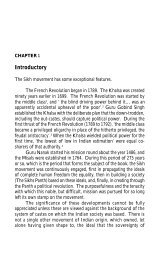Summary of Dr. Pashaura Singh's scholarship issues (part 1)
Summary of Dr. Pashaura Singh's scholarship issues (part 1)
Summary of Dr. Pashaura Singh's scholarship issues (part 1)
You also want an ePaper? Increase the reach of your titles
YUMPU automatically turns print PDFs into web optimized ePapers that Google loves.
language <strong>of</strong> certain passages and polished the metre.<br />
Note the following examples": GNDU MS 1245 FORM Vin bhane kia nai kari<br />
Mit vich ratan jawahar manak Jio jio hukm tivai tiv kar<br />
Kio sachiara hoie kio kurai tutai pal Bhandai bhao abrit tit dhal<br />
REVISED STANDARD FORM Vin bhane ke nai kari<br />
Mat vich ratan jawahar manak Jiv jiv ham tivai tiv kar<br />
Kiv sachiara hoie kiv kurai tutai pal Bhanda bhao amrit tit dhal<br />
Also, Guru Arjun Dev ji has been accused <strong>of</strong> making alterations in the revealed message <strong>of</strong> the Mul<br />
Mantra.<br />
Formulations in the Thesis<br />
"The Mul Mantar or the `root formula' with which the Adi Granth opens, is the basic theological<br />
statement <strong>of</strong> the Sikh faith. It consists <strong>of</strong> different epithets, all <strong>of</strong> which are traditionally understood as<br />
characterizations <strong>of</strong> Ultimate Reality, or Akal Purakh (`the Timeless Being'). It appears in Volume I<br />
<strong>of</strong> the Goindwal pothis as follows:<br />
Ik Onkar satgur parsad such nam kartar nirbhau nirikar akal murat ajuni sambhau.<br />
Sometimes there is an additional phrase Gur pure ke parsad `by the grace <strong>of</strong> the Perfect Guru' at the<br />
end <strong>of</strong> this text. But nowhere does this form <strong>of</strong> the Mul Mantar correspond to the standard version<br />
given in the Adi Granth. Evidently this was the form that was current during the period <strong>of</strong> Guru Amar<br />
Das." (Page 93)<br />
"The origin <strong>of</strong> the major components <strong>of</strong> the earlier form <strong>of</strong> the Mul Mantar as given in the Goindval<br />
pothis can be traced directly from the works <strong>of</strong> Guru Nanak." (Page 93)<br />
"Guru Ram Das invoked the divine attributes <strong>of</strong> the Mul Mantar in one <strong>of</strong> his compositions. The<br />
original verse resembles the text <strong>of</strong> the Mul Mantar and, similarly, it is free <strong>of</strong> any metrical or rhyme<br />
scheme. It reads as follows:<br />
Jap man nirbhau. Sat sat sada sat. Nirvair akal murat. Ajuni sambhau. Mere man an din dhiae nirankar<br />
nirahari. - Sarang Mahala 4 (1201) (Page 95)<br />
"The comparison <strong>of</strong> this text with the earlier form <strong>of</strong> the Mul Mantar given above clearly indicates the<br />
addition <strong>of</strong> the word nirvairu (`without enmity'), which Guru Ram Das employs to put emphasis on<br />
the divine attribute <strong>of</strong> benevolence. This may reflect his firm resolve to counteract the situation <strong>of</strong><br />
hostility in real life, created by the animosity <strong>of</strong> his rivals, with the spirit <strong>of</strong> love and friendliness.<br />
Thus a new theological dimension is added to the Sikh understanding <strong>of</strong> Ultimate Reality." (Page 96)<br />
"Although Guru Nanak has also employed the word nirvairu for the Supreme Being in his Ranilcali<br />
Dakhni Onkar (AG p. 931), the frequency <strong>of</strong> its use is greater in the compositions <strong>of</strong> Guru Ram Das."<br />
(Footnote No.14, Page 96)<br />
"Guru Arjun Dev worked over the text <strong>of</strong> the Mul Mantar in successive drafts to give it its final form.<br />
The<br />
Guru Nanak Dev University manuscript, which is an early draft <strong>of</strong> the Adi Granth, gives the form <strong>of</strong><br />
the Mul Mantar before its standardization:<br />
Ik onkar satnam kartapurakh nirbhau nirvairu akal murat ajuni saibhang satguru parsad.<br />
In his final version Guru Arjun replaced the phrase Satguru parsadi `by the grace <strong>of</strong> the True Guru'<br />
with gur prasadi, `by the grace <strong>of</strong> the Guru', presumably to provide a more coherent structure to the<br />
text <strong>of</strong> the Mul Mantar." (Page 96)

















